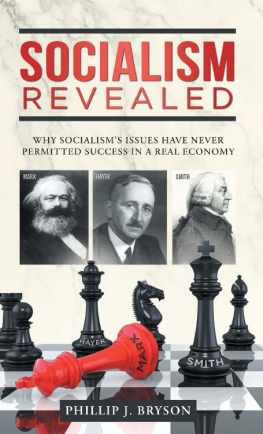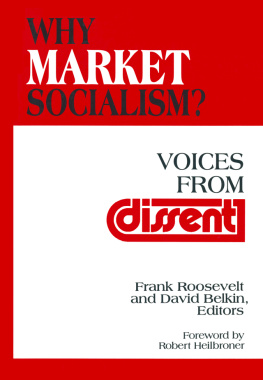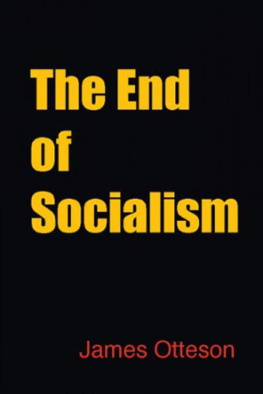SOCIALISM
Origins, Expansion, Decline, and
the Attempted Revival in the
United States
PHILLIP J BRYSON
Copyright 2021 by Phillip J Bryson
___________________________________________________
All rights reserved. This book or any portion thereof may not be reproduced or transmitted in any form or manner, electronic or mechanical, including photocopying, recording, or by any information storage or retrieval system, without the express written permission of the copyright owner except for the use of brief quotations in a book review or other noncommercial uses permitted by copyright law.
___________________________________________________
Created in the United States of America
ISBN:Softcover 978-1-63871-442-2
eBook978-1-63871-443-9
Republished by: PageTurner Press and Media LLC
Publication Date: 08/17/2021
___________________________________________________
To order copies of this book, contact:
PageTurner Press and Media
Phone: 1-888-447-9651
info@pageturner.us
www.pageturner.us
Also by Phillip J. Bryson
The Economics of Henry George: Historys Rehabilitation of Americas Greatest Early Economist
The Economics of Centralism and Local Autonomy: Fiscal Decentralization in the Czech and Slovak Republics
The Reluctant Retreat: The Soviet and East German Departure from Central Planning
End of the East German Economy with Manfred Melzer
Planning Refinements and Combine Formation in East German Economic Intensification, with Manfred Melzer
The Consumer under Socialist Planning: The East German Case
Scarcity and Control in Socialism: Essays on East European Planning
SOCIALISM
Origins, Expansion, Decline, and
the Attempted Revival in the
United States
PHILLIP J BRYSON
To Patricia
and to all those who love her most
Contents
The Corporation in the Capitalism of the
United States46
Anti-Corporate, Anti-Market Intellectuals and Social
Learning52
Part II Traditional Theoretical Conceptions of the Modern
Corporation61
Part III Contemporary Theories of the Corporation and the
Theory of the Firm79
Socialism before Marx: Pre-Marxian and
Utopian Socialism.94
Part 2: The Economic Theories of Karl Marx
Marxian Hatred for and Critique of Capitalism132
German Inspirationists at Amana, Economy, and Zoar
At Amana203
Bureaucracy: How Governments Manage Economic
Activity252
The Difference between Government and Corporate
Bureaucracy269
Central Planning Reform, Decentralization, and
Decline under Gorbachev333
Goals and Objectives of East German Consumption
Planning362
The Female Double Burdens (Doppelbelastung) in
Socialism.378
Needed: the Continued Development of an Independent
Small-Enterprise Sector.398
Designing Chinas New Economic Order: Market
and/or Plan407
Social Groups and the Future of the Party: A Schumpeterian
View410
Reform: The International Economy and the State-Owned
Enterprises422
Market Socialism: In Theory, in Hungary and
in Yugoslavia438
The Nature and Characteristics of Fascism, the Atypical
Socialism473
Socialism and Marx in the Era of Henry George and
Richard Ely524
Socialism and Marx in the Era of John
R. Commons and Walter Lippman533
Still no Socialist or Communist Party in 20th
Century America?544
Additional Strains of Socialism vs. Capitalism in
Contemporary Society560
Obama and Marx: Socialism in America at the End of the
Obama Presidency564
Economic Theory: Optimal Income Distribution is not
Equal Income Distribution589
Ethics and Corporate Social Responsibility from the
Viewpoint of Stakeholder Theory647
The State-Owned Enterprise under Soviet-type Central
Planning649
Reform of U.S. Corporations: Regulation Advocacy and
Stakeholder Theorists652
The Stakeholder Agenda vs. the Traditional Regulatory
Agenda657
A Practical Implication of Effective Administrative
Intervention663
The Status of Stakeholder Theory around the End of the
Obama Presidency664
Ethics and Stakeholder Theory: An Economics
Perspective673
The Stakeholder Agenda vs. the Traditional Regulatory
Agenda691
Purposes and Conclusions of Chapter 1,
Before the Age of Adam Smith.748
Purposes and Conclusions of Chapter 2,
Adam Smith and Market Exchange.749
Chapter 3, The Corporation and
Capitalism in the United States.751
Purposes and Conclusions of Chapter 6,
Marxism after Marx.755
Chapter 8, Bureaucracy: How Government
Manages Economic Activity.758
Chapter 10, Central Planning Reform,
Decentralization, and Decline under Gorbachev762
Purposes and Conclusions of Chapter 11,
East German Consumption Planning.763
Purposes and Conclusions of Chapter 15, Socialism in
Democratic Western Europe.767
Chapter 16, Socialism of the National Type in the
United States.771
Purposes and Conclusions of Chapter 18, Socialism and
the Welfare State.774
Chapter 19, The Academic Contribution to American
Socialism: Stakeholder Advocacy.776
Chapter 20, Ethics and Stakeholder Theory: An
Economics Perspective.777
Purposes and Conclusions of Chapter 21, Socialism
and Tyranny.780
Preface
Each of the three parts of this book represents a self-contained topic and theme. The three parts are clearly related, but each addresses a completely different aspect of the more general topic of socialism.
First, the origins and ideas of socialism represent, more or less, a history of economic thought. Socialism is more than a topic of economics, of course, although that is the core aspect of the subject. I also find fascinating the facets of religion, ethics, politics, etc., in Marxism. Socialism is not a religion, of course, but it is a substitute for religion for many of a progressive nature. Most progressives are apparently of a religious bent only when a political campaign is in progress, but for them socialism is an answer to the moral and ethical questions that historically have tended to grow out of religion.
My approach to the second part of this project to the attempts to implement socialist economic theory is a question of comparative economic systems addressed to the most important actual economies of our era. I spent a career researching the Soviet- type economy and central economic planning. I also did some teaching for quite a few years in those areas. I watched the attempts of the socialist countries over nearly three decades to find a way to reform the Soviet-type economic system, and I watched the failure of the final effort under Gorbachev.
I was living in Berlin when the East German SED (Communist Party) built the Wall through the middle of the city and around West Berlin. I saw the red banners posted in East Berlin proclaiming the victory of socialism and its glorious achievements. I talked to people who had successfully escaped East Berlin and read of those who died in the attempt. Nearly thirty years later I was attending an academic conference in West Berlin in the Reichstag, which had been reconstructed as a conference center. That was in November of 1989. In the middle of the week I spent at that conference, the Wall was declared open and there was rejoicing in both sides of the city. I walked from one side to the other with East German friends who saw the West on that occasion for the first time. What remarkable, contrasting experiences I had when the Wall went up and when it came down.
Unfortunately, I also lived through the social phenomena described in the third part of the book the attempt to bring about a fundamental transformation of the United States into a socialist country. That was under President Obama whose full socialist ideology was hidden from the electorate of the United States in 2008. The president was well aware that the country had from its founding steadfastly and resolutely opposed organized socialism. However, the dismal economic conditions prevailing in the country at the time President Obama came into office facilitated a shift to the left, just as the Great Depression had paved the way for the introduction of collectivist policies under Franklin D. Roosevelt. Whether Mr. Obamas attempted transformation of the country will ultimately prove successful after his tenure in office is not yet clear. It is apparent that he moved the Democratic Party and the country well to the left of where it had traditionally functioned. At the time of writing, it was apparent that Hillary Clinton, the presumptive Democratic nominee for the presidency in the 2016 elections would advocate for an extension of the Obama policies in pursuit of redistributing incomes. The socialists of the Democratic Party are a strong constituency, but it is not clear whether they will be able to pull the nation further in the direction of socialism.
Next page







